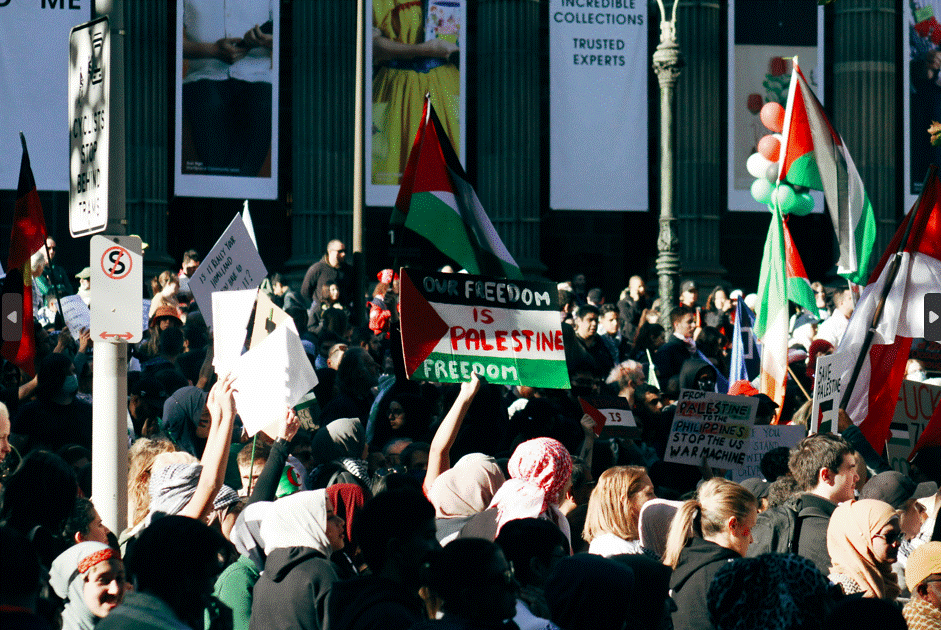02-05-2024
Marina Sáenz
East Asia Researcher,
Global Human Rights Defence.
In the tumultuous landscape of the conflict between Israel and Palestine, where political rifts and conflicts often seem insurmountable, a glimmer of hope emerges as China takes centre stage in mediating talks between rival Palestinian factions, Hamas and Fatah. Against a backdrop of longstanding discord and recent escalations in violence, the quest for Palestinian unity has become more urgent than ever. However, on April 30th, China’s Foreign Ministry spokesperson Lin Jian delivered a ray of optimism, confirming that both groups convened in Beijing and committed to “continue this dialogue process so as to achieve Palestinian solidarity and unity at an early date”. As China steps into the fray, its diplomatic efforts offer a beacon of possibility in a region fraught with division and strife.
During the Beijing meeting, both Fatah and Hamas articulated a unified stance, emphasising the unwavering solidarity among Palestinians amidst the Israeli conflict in the Gaza Strip. Their collective focus on terminating Israel’s genocidal actions against Palestinians and ensuring the complete withdrawal of occupying forces was notably resonant. Furthermore, they jointly stressed the urgent need to coordinate national efforts to swiftly deliver vital humanitarian aid across Palestinian territories. The recognition of the importance of reinvigorating joint committees, resolving internal disputes, and quelling mutual media accusations was mutually acknowledged, signalling a renewed commitment to internal cohesion. Equally emphasised was the necessity of harmonising initiatives in the occupied West Bank and Jerusalem to counter illegal settler incursions and safeguard the sanctity of sites like the Al-Aqsa Mosque. As both factions unite in common cause, their concerted efforts represent a pivotal step towards fostering stability and resilience in Palestine.
The historical and political backdrop between Hamas and Fatah is fraught with tension. In 2006, Hamas secured victory in the Palestinian legislative elections, sparking negotiations with the Palestinian Authority, led by Fatah, regarding the establishment of a unity government. Despite initial attempts at reconciliation, tensions persisted between the two factions. Hamas, under the leadership of Ismail Haniyeh, expressed conditional support for a Palestinian state along the 1967 borders but refrained from outright recognition of Israel. The proposed unity government collapsed in the face of opposition from Israel and the United States, who withheld recognition and imposed economic sanctions. This discord culminated in Hamas’ expulsion of Fatah from the Gaza Strip following a brief war in 2007. Subsequently, Hamas has faced a protracted siege by Israel, particularly intensified after its attacks in southern Israel on October 7th, 2023. Concurrently, Fatah’s governance in the West Bank has encountered challenges, including an expanding Israeli presence, economic stagnation, and accusations of corruption. The relationship between Hamas and Fatah has remained strained, perpetuating the schism between the two factions to this day. China’s Foreign Ministry spokesperson Lin Jian said that both parties “highly appreciated China’s firm support for the just cause of the Palestinian people in restoring their legitimate national rights, thanked the Chinese side for its efforts to help strengthen Palestinian internal unity and reached an agreement on ideas for future dialogue”.
As discussions between Hamas and Fatah gain traction with China’s mediation, the spotlight shifts to the critical aspect of human rights within the Palestinian territories. While Hamas has been labelled a terrorist group by many Western nations in the wake of the October 7th attack, Beijing has refrained from echoing this condemnation. Meanwhile, UN Chief Antonio Guterres has strongly condemned Israeli retaliation, citing it as a clear violation of International Humanitarian Law. This condemnation is supported by evidence of attacks on civilian targets, the use of prohibited weapons such as white phosphorus, and interference with humanitarian aid – all flagrant breaches of core provisions outlined in the Geneva and Hague Conventions.
Despite Western criticism of China’s regional motives, often perceived as part of its Cold War strategy to diminish US influence, Beijing has consistently advocated for Palestine’s full membership in the United Nations, championing Palestinian nationhood and the right to self-government. Moreover, China underscores the imperative of achieving peaceful coexistence between Palestine and Israel, emphasising its dedication to fostering stability and cooperation in the region. China’s engagement in the Middle East transcends economic influence, as demonstrated by its proactive diplomatic initiatives. In March 2023, China facilitated talks between regional powerhouses Saudi Arabia and Iran, culminating in an agreement to restore diplomatic relations. Additionally, in April 2024, amidst escalating tensions between Iran and Israel, China urged restraint and called for measures to mitigate the spillover effects of the Israel-Gaza conflict, with Tehran assuring Beijing of its commitment to de-escalation.
Sources and further reading:
Zhao Ziwen. (26 April 2024). China hosts talks between rival Palestinian factions Hamas and Fatah in bid to end internal divisions: report. South China Morning Post. Accessed 2 May 2024. https://www.scmp.com/news/china/diplomacy/article/3260508/china-hosts-talks-between-rival-palestinian-factions-hamas-and-fatah-bid-end-internal-divisions?campaign=3260508&module=perpetual_scroll_0&pgtype=article
Laurie Chen and Nidal Al-Mughrabi. (1 May 2024). China says Hamas and Fatah voice will for Palestinian reconciliation. Reuters. Accessed 2 May 2024. https://www.reuters.com/world/china/china-says-hamas-fatah-express-political-will-reconciliation-2024-04-30/
Agencies and Toi Staff. (30 April 2024). China: Hamas, Fatah showed ‘political will’ for reconciliation in recent Beijing talks. The Times of Israel. Accessed 2 May 2024. https://www.timesofisrael.com/china-hamas-fatah-showed-political-will-for-reconciliation-in-recent-beijing-talks/
The Associated Press. (30 April 2024). China says rival Palestinian groups Hamas and Fatah made ‘encouraging progress’ in talks in Beijing. ABC. Accessed 2 May 2024. https://abcnews.go.com/International/wireStory/china-rival-palestinian-groups-hamas-fatah-made-encouraging-109777552








Comments